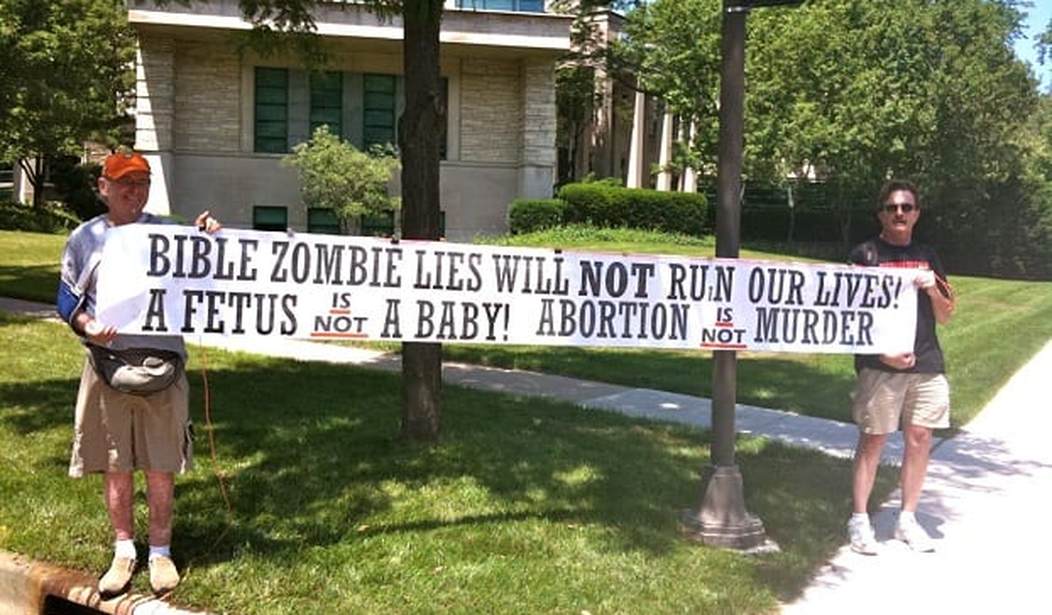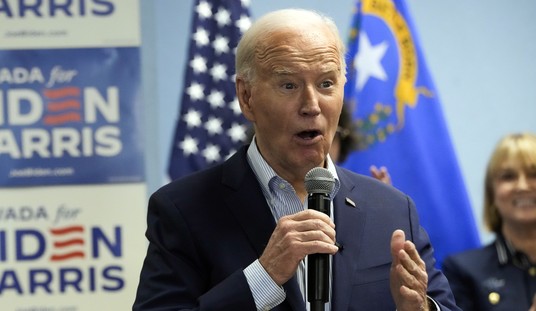 Texas State Senator Wendy Davis, who is running for governor, has made a fetish of supporting abortion. Her sole qualifying factor in running for governor was her filibuster of a bill restricting abortion, a filibuster that was only possible because the leadership of the Texas legislature grossly mismanaged the bill. In her memoir “Forgetting To Be Afraid,” she recounts her personal experience in having two abortions.
Texas State Senator Wendy Davis, who is running for governor, has made a fetish of supporting abortion. Her sole qualifying factor in running for governor was her filibuster of a bill restricting abortion, a filibuster that was only possible because the leadership of the Texas legislature grossly mismanaged the bill. In her memoir “Forgetting To Be Afraid,” she recounts her personal experience in having two abortions.
One was an ectopic pregnancy which occurs when the fertilized egg implants outside the uterine cavity, most commonly in the Fallopian tubes. This is a not uncommon occurrence and may, or may not, require surgical intervention. That intervention may, or may not, constitute an abortion (here | here | here). That is not what has caused the buzz:
Davis, in a copy of the book obtained by the San Antonio Express-News, wrote that her unborn third daughter had an acute brain abnormality. She said doctors told her the syndrome would cause the baby to suffer and likely was incompatible with life.
After getting several medical opinions and feeling the baby they had named Tate Elise “tremble violently, as if someone were applying an electric shock to her” in the womb, she said the decision was clear.
“She was suffering,” Davis wrote.
The unborn baby’s heart was “quieted” by her doctor, and their baby was gone. She was delivered by cesarean section in spring 1997, the memoir says.
Davis wrote that she and her then-husband, Jeff, spent time with Tate the next day and had her baptized. They cried, took photographs and said their good-byes, she wrote, and Tate’s lifeless body was taken away the following day.
This anecdote is supposed to engender sympathy for Davis, according to The Daily Beast article Wendy Davis and the ‘Good Abortion’ Myth:
To be nationally ridiculed as “Abortion Barbie” and then to reveal in the middle of a tightly-contested election that you’ve had an abortion is nothing short of a big effing deal. That is especially true when that election is in Texas, a state that hasn’t had a Democrat in the governor’s mansion in nearly 20 years. (Not to mention that both of the state’s current senators are Republican and 25 of the 36 districts have Republican representatives.) Oh, and Texas is also home to the movement toboycott Girl Scout cookies for allegedly promoting pro-abortion agendas and individuals (like Davis).
Davis was incredibly brave to share her personal story about abortion. There are no two ways about it. But her abortion narrative—the language, the justification, the post-procedure emotions—is one that is already relatively acceptable to many Americans, even ones who are on the fence about abortion. A poll sponsored by none other than the National Right to Life Committee showed that all but 11 percent of Americans thought abortions were permissible when it came to cases where the mother’s life was at stake.
This opinion is echoed in the San Antonio Express-News story:
Rice University political scientist Mark Jones said he doesn’t expect the revelation to lose any votes for Davis, since he said it’s a relative small proportion of voters who oppose abortion in cases of severe fetal abnormality.
“The group that will be most bothered by her having an abortion of a baby with a severe fetal abnormality is a group that wasn’t going to vote for her anyway,” he said.
“The positive side of it for her is it humanizes her, and also makes it a little tricky for opponents to attack her on the abortion issue because now, it not only is a political issue for her, but it’s a personal issue,” Jones said.
Perhaps in pro-abort circles. But anyone who is not passionately attached to the liberal sacrament of abortion should look askance at this story:
One of the key arguments pro-aborts always make is that the fetus really isn’t a child. Because if it were a child then killing the fetus would be something called “infanticide.” Never mind that in 38 states you can go to prison for killing a fetus:
Currently, at least 38 states have fetal homicide laws. The states include: Alabama, Alaska, Arizona, Arkansas, California, Colorado, Florida, Georgia, Idaho, Illinois, Indiana, Iowa, Kansas, Kentucky, Louisiana, Maine, Maryland, Massachusetts, Michigan, Minnesota, Mississippi, Nebraska, Nevada, North Carolina, North Dakota, Ohio, Oklahoma, Pennsylvania, Rhode Island, South Carolina, South Dakota, Tennessee, Texas, Utah, Virginia, Washington, West Virginia and Wisconsin. At least 23 states have fetal homicide laws that apply to the earliest stages of pregnancy (“any state of gestation,” “conception,” “fertilization” or “post-fertilization”); these are indicated below with an asterisk (*).
In this case, Davis makes it abundantly clear that she knew that she was carrying a baby, one doesn’t name and baptize a thing. She decided to make the decision to kill her baby rather than carry it to term based on the decision that it was going to die anyway. Like we all aren’t. Rather than courageous, Davis is revealed as a callous, brutal individual who decided to kill her own child and now, paradoxically, expects us to regard this decision as heroic. It wasn’t. It was wrong and the fact that she was, at least according to her tale, emotionally traumatized indicates that she knew what she had done was murder or damned close to it:
“An indescribable blackness followed. It was a deep, dark despair and grief, a heavy wave that crushed me, that made me wonder if I would ever surface. … And when I finally did come through it, I emerged a different person. Changed. Forever changed,” Davis wrote.
This portrayal of abortion as a heroic decision has become part of the liberal playbook. Pregnancies, not babies, are terminated. Pregnancies, not babies, are aborted. The mother is courageous for killing her baby because her life will be better without the baby. The baby’s life was going to suck anyway, because of financial privation or health or terminal illness or Mom wouldn’t be able to go to college or because it babies are messy little beasts and Mom had other plans for her life. And, you know, the baby knows that and if it could speak would be the first to congratulate the mother on her decision. Mom, of course, is sad, but she moves on with her life. The baby: not so much.
Davis ends the book with a story of a time she felt Tate said good-bye to her, when she and her husband and friends were on a golf course and Davis was caught in a cylindrical swirl of leaves, lifted by the wind.
“And I felt her. I was sure of it. Tate. Moving through me, saying her good-byes to me. Letting me go,” Davis wrote.
The Davis story is horrific and underscores the quandary faced by pro-abort forces. Absolutely no one with an IQ in double digits or higher has any doubt that a pregnant woman is carrying a baby. While polls and surveys show that Americans are sympathetic to case for abortion in select instances, they, by and large, oppose killing children. This has forced them to emphasize abortions which are a distinct minority, i.e., those impacting the life of the mother, fatal deformity, or the famous and virtually non-existent categories of “rape and incest,” in order to protect what they really want: to be able to kill any child in utero for any reason:
Not only would I have to be on bed rest at 20 weeks, I wouldn’t be able to fly after 15. I was already at eight weeks. When I found out about the triplets, I felt like: It’s not the back of a pickup at 16, but now I’m going to have to move to Staten Island. I’ll never leave my house because I’ll have to care for these children. I’ll have to start shopping only at Costco and buying big jars of mayonnaise. Even in my moments of thinking about having three, I don’t think that deep down I was ever considering it.
As The Daily Beast story elaborates:
In her 2011 book, How to be a Woman, author Caitlin Moran writes about “good” abortions vs. “bad” abortions. “Good”abortions are the ones for a “raped teenager” or “a mother whose life is endangered,” and “these women get away with barely any stigmatization.” Then, there are “bad” abortions, the “worst” being “repeated abortions, late-term abortions, abortions after IVF, and—worst of all—mothers who have abortions.” Moran fell into the later category when she decided to have an abortion after already having two daughters, and she didn’t hesitate to emphasize how clear and simple the choice was for her:
I’m not being flippant when I say it took me longer to decide what countertops to have in the kitchen then whether I was prepared to spend the rest of my life being responsible for a further human being, because I knew that do it again—to commit my life to another person —might very possibly stretch my abilities, and conception of who I am, and who I want to be, and what I need and need to do —to a breaking point.
In this view, any story that separates abortions into “good” and “bad” categories is negative because it defeats the larger agenda of making infanticide on demand a decision that is not subject to discussion much less moral scrutiny. Davis’s story must be seen for what it is, an attempt to remove any possible value judgment from abortion.
Wendy Davis reminds us of the story of the kid who kills his parents and asks for leniency because he is an orphan. Had Wendy Davis lost a baby to fatal congenital defects she would be deserving of our sympathy. She didn’t. And she isn’t. Her defense of infanticide, given her personal experience, is inexplicable outside of political expediency. Her attempt to ennoble a cruel and uncivilized practice by the use of anecdote should earn her our contempt not our respect.













Join the conversation as a VIP Member